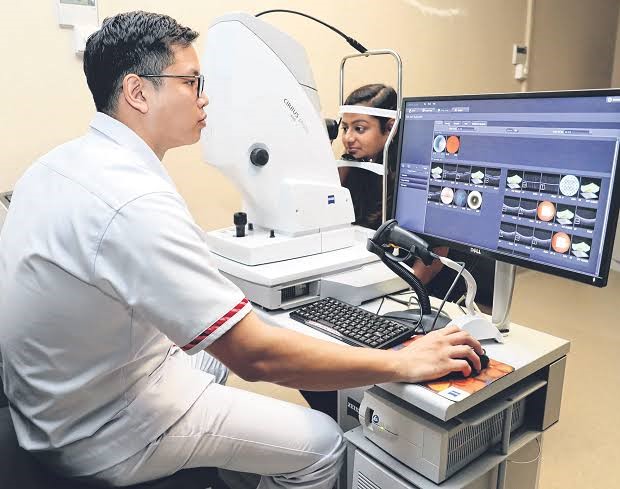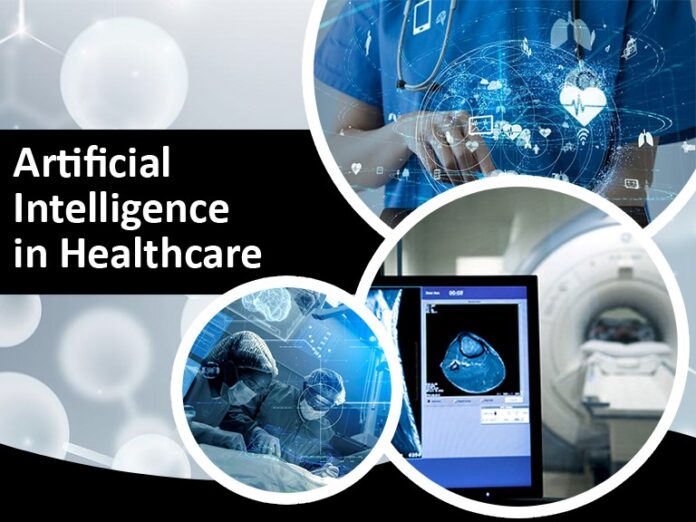Did you know that artificial intelligence (ai) can analyze large amounts of data gathered by healthcare organizations in the form of medical claims, images, and clinical research trials? Yes. This is all about technological advancements.
Technological advancements are progressing with each passing day worldwide, and are easing the lifestyle of mankind rapidly. Admittedly, the technological world is making the accomplishment of every task only a single click away. And one of the biggest inventions that are developing nowadays is AI (Artificial Intelligence).
What Is Artificial Intelligence, And Its Example?
Artificial Intelligence (AI) is also called machine intelligence. In artificial intelligence, a computer-controlled robot works like a human mind and performs various tasks. In short, human intelligence is being processed by computer systems in AI to perform different functions. For example, speech recognition, natural language processing, and many others.
For instance, chatbot, also known as chatterbots, is a type of artificial intelligence used in messaging applications. It is an automatic robotic tool that interacts with customers in messaging like a human.
Another example of AI is Q&A platforms with advanced features of Microsoft Word, such as fancy grammar checks and typo errors. It uses machine learning and AI to spot typing and grammar mistakes.
The latest research about AI shows that the market size of artificial intelligence in 2020 was approximately $51.08 billion and is expected to increase up to $641.3 billion in 2028. Moreover, a recent survey revealed that more than 90% of top businesses have an ongoing investment in artificial intelligence.
But did you know that artificial intelligence can be helpful for healthcare as well? In this article, we will discuss how AI works for the health sector.
Introduction Of AI In Healthcare
AI in healthcare is the implementation of machine learning algorithms and other cognitive technologies in a medical setup. In the healthcare market, artificial intelligence grew at a rate of 167% in the two years from 2019 to 2021.

In AI, computers and other machines have the capability of recognizing, learning, thinking, and making decisions by utilizing robotic functioning.
AI in healthcare analyses and acts on medical data to execute a particular outcome. AI efficiently assists doctors, nurses, pharmacists, and other medical providers in their daily work by enhancing preventive care and the quality of life of patients.
For example:
- AI helps medical providers make accurate diagnoses and treatment plans by using patient data and other information.
- AI can analyze extensive medical data and make the healthcare system more proactive. This improves preventive care for patients.
- Artificial Intelligence can predict the spread of infectious diseases by critical data analysis from different sources. This results in combating epidemics and pandemics.
Different Types of Artificial Intelligence
The current system of classification categorizes AI into four types, which are discussed below.
1) Reactive AI
The most common type of artificial intelligence is reactive AI. It provides a defined output based on the input it receives and works in the same manner every time. Reactive AI cannot learn actions or analyze data about the past or the future. Another limitation of reactive AI is that it cannot perform tasks they are not designed for. These limitations led to the development of other types of AI.
Examples of reactive artificial intelligence include:
- Email spam filters
- Deep blue
- Netflix recommendation engine
2) Limited Memory AI
Limited AI is capable of analyzing data from the past by observing previous actions. It uses historical, pre-programmed information, and observational data to predict and perform complex tasks.
It is a type of AI that is most widely used nowadays. But as the name suggests, with limited memory AI can store limited information and does not have a long-term memory.
Examples of limited memory AI include:
- Autonomous vehicles. They use limited memory AI to analyze the speed and direction of other cars and adjust driving.
3) Theory Of Mind
Theory of mind AI is not developed yet. This type of AI will be capable of understanding people’s emotions, and beliefs, and interacting socially with humans.
4) Self-aware AI
Self-aware AI is the most advanced type of artificial intelligence which is in the process of development. It requires critical algorithms and hardware to support it.
Have you ever heard about any machine having emotions and desires? Yes! That is self-aware AI. This type of AI machine will be aware of their internal emotions and mental states as well as the emotions of their surroundings.
Before COVID VS After COVID Healthcare Scenario
Before COVID, healthcare setups were functioning normally. Patients used to visit hospitals without worrying too much about catching diseases and infections. But after the pandemic hit the world drastically, it created a severe mental, physical, social, and economical impact on people’s lives.
Every disease was assumed as COVID, and people were extra cautious in visiting healthcare settings. Even individuals having COVID didn’t go for lab tests or urgent treatment which resulted in the death of a majority of the population worldwide.
Moreover, many doctors offering routine checkups and elective procedures suffered from major financial crises during and after the COVID, as people preferred to visit hospitals only in extreme emergencies.
With that, artificial intelligence and machine learning can play a leading role in preventing the spread of COVID and future pandemics by predicting the structure of proteins necessary for virus entry and replication. However, the development of AI for this purpose is still in progress and is expected to arise in the future.
Growth Of Artificial Intelligence (AI) In The Coming Future
Various types of artificial intelligence are in their development phase and are expected to grow in the coming future. Research reveals that jobs requiring AI skills are expected to grow by 71% in the next five years.
The future of AI in healthcare can range from simple to complex tasks. It can include:
- Answering phone calls
- Medical record review
- Therapeutic drug design
- Medical device design
- Clinical diagnosis
- Designing treatment plan
- Reading radiology images
- Talking with patients
Goal Of Computer Vision for Healthcare
Computer vision is the subcategory of AI that uses digital systems to analyze, process, and interpret visual data. It can identify an object or an individual in a digital image and execute the desired action.
The goal of computer vision in healthcare is to make a more accurate diagnosis and help medical professionals in making better decisions for the treatment of patients.
Computer vision can make more accurate medical image analysis of a particular organ or tissue by creating an in-depth visualization.
Author

Pankaj S. is the Co-founder and CEO at ClinicSpots. A serial entrepreneur, Pankaj is a passionate Content Creator and Content Marketer. He has more than 15 years of diverse experience in healthcare, entrepreneurship, business, and product development. His creation, ClinicSpots, is a digital health company that empowers users (patients) to find doctors and envisions creating the world’s next Medical Quora.
Read Also
- Automated Healthcare Software Solutions: How Intelligent Platforms Are Redefining Clinical, Administrative, and Operational ExcellenceThe healthcare industry is undergoing a seismic transformation. Rising patient volumes, value-based care models, staffing shortages, and complex regulatory demands have prompted organizations to look beyond traditional tools and embrace advanced software automation. As providers search for innovative partners capable of tailoring these sophisticated systems to real-world workflows, many turn to MCSI (Managed Care Systems,… Read more: Automated Healthcare Software Solutions: How Intelligent Platforms Are Redefining Clinical, Administrative, and Operational Excellence
- Why Whole Slide Imaging Shapes the Future of Digital PathologyWhole slide imaging has become one of the most important developments in modern pathology. It changes how tissue is examined, how cases are shared and how pathologists collaborate with the wider care team. More than a technological upgrade, it represents a shift in how laboratories think about their workflow, their storage needs and the tools… Read more: Why Whole Slide Imaging Shapes the Future of Digital Pathology
- Comparing 2025 Dental Practice Management Software OptionsSoftware Key Strengths Potential Limitations Best For Dentimax • Offers both cloud-based and on-premise/server deployment. • Tight integration between imaging (e.g. X-ray sensors) and practice management, charts, treatment planning, imaging all in one. • Transparent pricing and relatively simple UI/usability; solid for small to medium general practices. • May lack some of the… Read more: Comparing 2025 Dental Practice Management Software Options
- Top Innovations in Dermatology and Skincare TechnologiesHave you ever wondered how skincare keeps getting better year after year? From fighting acne to reducing wrinkles, today’s treatments seem more advanced than ever before. The tools and techniques used by dermatologists today are smarter, safer, and more effective than those we had just a few years ago. These breakthroughs don’t just help with… Read more: Top Innovations in Dermatology and Skincare Technologies
- Telehealth and Beyond: Building a Connected Continuum of CareHealthcare is on the verge of a radical transformation. Technology no longer simply supports medicine; it actively shapes how care is delivered and experienced. Achieving a seamless continuum demands more than deploying tools—it requires intentional design, coordinated teamwork, and innovative platforms that adapt to diverse clinical and patient needs. This article explores key strategies for… Read more: Telehealth and Beyond: Building a Connected Continuum of Care






